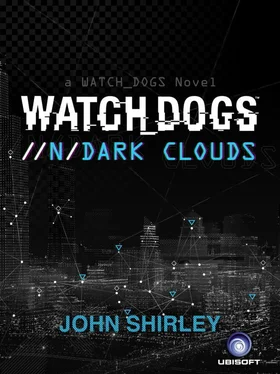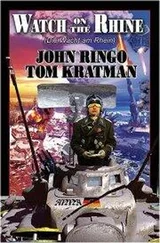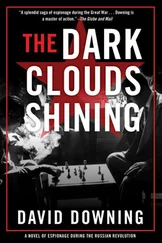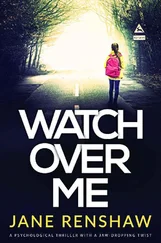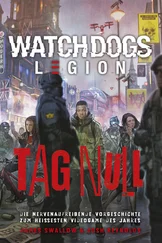Blank wore a grubby overcoat that might have been black—or might have turned black; its lower hem was frayed almost like the fringe on a leather jacket; two of its large black buttons were missing. A wide brimmed, dented slouch hat angled almost rakishly on Blank’s head, half hiding one eye—instead of a hat band, the hat had a battery powered electric light strapped on it, a surprisingly powerful light, now switched off. Blank’s brown eyes were all that remained intact of his face—the rest of it had been burned away. Pink scar tissue from the old burns overlapped like bandages of raw flesh across his cheeks. His mouth had been burned lipless, and his snaggled, blackened teeth were perpetually visible. His nose was mostly burned away; one of his eyelids was just a parchment-like scrap of skin; his eyebrows were just a memory. His face looked, to Wolfe, like a face in a drawing that had been mostly erased by a hurried artist. There was no clear cut face there. That was one reason he was called Blank.
There was another reason, Wolfe knew. Blank lived off the grid, even when he walked around within the grid.
Many homeless people actually had cell phones. Cheap phones were given to them by family, or social services. They often used free computers in a library, or borrowed a friend’s laptop. Some homeless were ex-I.T. workers who’d been laid off one too many times, and still had a lot of tech when they could get it powered up.
But not Blank. Not only did he have no cell phone, he didn’t even have an electric watch, or a portable radio. He had no driver’s license, no state I.D., no social services I.D. No identification card at all. He had no wallet, and it was said he had no tattoos—or none that hadn’t been burned away. His fingers had been as badly burned as his face… so he had no fingerprints.
Facial recognition wouldn’t work on a man without a face. And he never told anyone his real name. People on the street knew him only by the moniker “Blank”.
Blank was blank.
“Wolfe…” Blank’s voice was a gurgling growl—his voice, too, was blank, without its original character, because his vocal chords had been burned by hot smoke in the nameless fire that had burned him so badly. Rumor had it that years ago, when he was first homeless, Blank had been sleeping in a crack house, and someone careless with his dope lighter had set the place on fire. Most people in the house had burned; Blank had gotten out… or part of him had.
But that story was just a rumor. Blank’s past was blank, too.
Wolfe could see why the scarred derelict was useful to Aiden Pearce. It was hard to trace Blank—which made him the perfect “bagman” and streetside go-between.
“They’re gone,” Blank said, turning toward the street.
Wolfe saw, then, that Blank’s left ear was missing. There was just a hole in the side of his head.
“Who was that?” Wolfe asked.
“Gangbangers. Viceroys.”
“You got a message for me?”
“Maybe. I’m just lookin’ in on you for Pearce.”
“He can look in on me anytime he wants, what I’ve seen.”
“You ain’t using the camera scrambler?”
“I am, yeah.”
“So he needs me to check on you while you’re out, at least in some places. ‘Nother thing, he just decided: you get the tool for sure. I’ll be telling you where to find it tomorrow. Meet me at noon….”
“Noon tomorrow. Okay. Where?”
“The camp where we first met.”
“That where you stay?”
Blank took off his hat for just a moment to wipe the top of his head with his hand… and Wolfe saw that most of the tramp’s hair had been burned away in that long ago conflagration. Only a few tufts of gray hair stuck out, in random spots.
Blank put his hat back on and said, “I don’t stay any place longer’n six or seven hours at most. Mostly not longer’n six or seven minutes . Got to keep moving! Not much use to anybody if I don’t keep moving.”
“Okay. The homeless camp under that same overpass, right? At noon. So—you have no cell phone… how does Pearce get in touch with you?”
“He has his ways. Puts messages up for me somewhere. They come and go quick and only I know what they mean. Uses what he calls ‘a drop’ too.”
“I know what that is.”
“Tomorrow at noon, Wolfe. Careful going back to that safehouse he’s got you in. Watch your back on the way there. And before you leave here, press the scrambler again for the cameras. The effect probably done wore off.”
Then he switched on the hat light, and went out of the alley… and Wolfe knew that the hat’s glare blurred his image when he walked under the cameras. His face was “faceless”—but a scarred face is recognizable too. The glare made him just a blur from the neck up, so they couldn’t even see his hat.
Wolfe waited a couple of minutes, then went out onto the sidewalk. There was no sign of Blank out there now. He was gone.
#
Wolfe had almost reached the partly pushed-over fence around the projects building when he realized that someone was following him.
He turned, and saw several black men in hoodies and sagging pants walking stolidly his way, their eyes locked on him.
Wolfe stepped onto the overturned fence, clambered over it, and hurried between the old, thickly tag-marked high rises. He went as fast as he could without running. Running would show fear, instead of respect. Showing fear was dangerous out here.
On the wall to his left was a big crown-shape, a cartoon of a king’s crown, stenciled in day-glo orange. Black Viceroys. No one had dared put their tags over that symbol.
He stepped over debris, boots crackling on broken glass, and strode quickly around a corner of the building to the left, and the now-doorless entrance of the high rise. Straight ahead through the door was a rubble-strewn corridor; to the right was the concrete and metal stairs he was going to take up to the seventh floor.
At least, he’d have done that if three more gangbangers hadn’t blocked his way.
They stepped out of the stairs, two of them carrying crowbars in their hands. The third one, the tall one in the middle with his hair dyed orange, had a 9 mm pistol in his waistband. Day-glo orange shoelaces were woven into his signature sneakers, and orange trim on his black vinyl windbreaker.
“Where you think you’re going?” the Black Viceroy asked. And the Viceroy put his hand on the butt of his 9 mm semi-automatic.
The tall one in the middle was their leader, Wolfe figured. He was the Black Viceroy here who had had the requisite nimbus of authority. And he had a little more maturity—he looked to be in his mid to late thirties.
Wolfe looked him in the eye and said, “I’ve got a gun, too. We don’t want to use those. Somebody probably get shot. Might be me.”
The tall one almost smiled. “Let me see the gun. Show it real slow.”
Wolfe, real slow, unbuttoned his coat, opened it, to show the .38 stuck in his belt.
“That a lot smaller gun than yours, Shuggie,” said the Viceroy on Shuggie’s left.
Shuggie grinned, showing a gold grill. “Yeah. I got a niner. He got a snub nose.”
“At this range, a .38 will do the job really well,” Wolfe said, keeping his voice calm and even.
“Don’t even think about it, man,” Shuggie said. “You better look behind you.”
Wolfe glanced over his shoulder. The three Black Viceroys who’d been following him earlier were there, a few steps away. One of them lifted up his sweatshirt to show his own 9 mm pistol.
Wolfe looked back at Shuggie and nodded. “You could rob me, but I got only twenty dollars on me. No credit cards. Boots aren’t worth much. I haven’t been out of prison all that long so… I’m still kinda broke.”
Читать дальше
